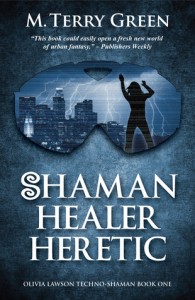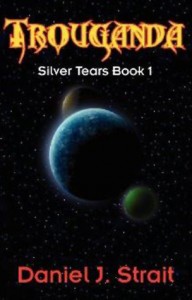
Author, Aaron Overfield, sent me an e-copy of his sic-fi novel VEIL.
Description from Goodreads:
Dr. Jin Tsay’s revelation entices the military with a potential to uncover and disarm any covert threats. The government that funded the engineer’s classified project orders Tsay’s death, so they can solely and secretly possess his alluring technological consummation: VEIL
Veil proves to be the purest, deepest form of espionage and anti-terrorism by endowing humankind with the ability to experience life through another person. Dr. Tsay’s technology offers submersion into another’s mind; Veil provides a direct perception of their immediate thoughts, emotions, memories, and the rush of their most intimate senses. If it ever escapes the military’s relentlessly selfish grip, Veil swears to permanently alter the psychosocial, sexual, political, economic, and religious landscapes of our lives. Veil promises to usher in our ultimately unifying evolution: the New Veil World.
Retribution for Dr. Jin Tsay’s assassination comes in the form of his widow, who races to deliver Veil unto the world and share it freely, before those who ordered her husband’s murder can exploit it. Wielding the inescapable force of Veil, Suren Tsay seeks to inflict justice upon all those responsible for her husband’s demise, culminating in an unforgiving, brutal, obsessive hunt for the elusive killer of the father of the New Veil World: the Great Jin Tsay.
Taking Veil beyond limits Jin himself could’ve imagined, the revered Widow Tsay vows to get her revenge at any cost. Suren Tsay soon realizes she too must inhabit the world created by her husband’s invention and her own bloodlust.
Suren must learn to live in the New Veil World.
She must also fight to liberate it.
Review:
When the Widow Tsay decides to avenge the death of her husband the world will never be the same. In telling her story Aaron Overfield’s Veil presents a convincing and frightening vision of social evolution.
The absolute best part of this book is the way people relate to one another. Emotions aren’t just surface decoration, but are all encompassing. People love with their whole heart and hate just as strongly. They also contradictorily treat each other with complete irreverence. They call each other nasty names and fling politically incorrect insults at one another, as only those most comfortable with each other can. Most of which is really funny. So are a lot of the author’s interjections. While this makes the book a joy to read there really is a serious message here. What is the moral responsibility of science and scientists? What marks us out as individuals and how much of this is necessary to live appreciable human lives? Like Huxley or Orwell, Overfield forces the reader to imagine how dangerous it can be to give up too much of their autonomy, no matter how well-intentioned the organisation involved.
Despite the bold characters I wouldn’t consider the book to be character driven (unless you consider Veil as a character). It tends to leap at regular intervals, leaving the main cast to age unobserved. Every time it did this I thought, ‘no I want to know more about what happened next.’ I was quickly engrossed in the next epoch of Veil, however, and forgot my disappointment.
The book is quite long and does tend to repeat itself. This might or might not be a purposeful attempt to remind the reader of earlier events. I don’t know. Either way, while it is noticeable it isn’t particularly distracting.
If you pick this one up I recommend reading all of the book, and by all of it I mean everything from the copyright page to the epilogue and beyond. It’s worth it. (Not something I have cause to say often.)



